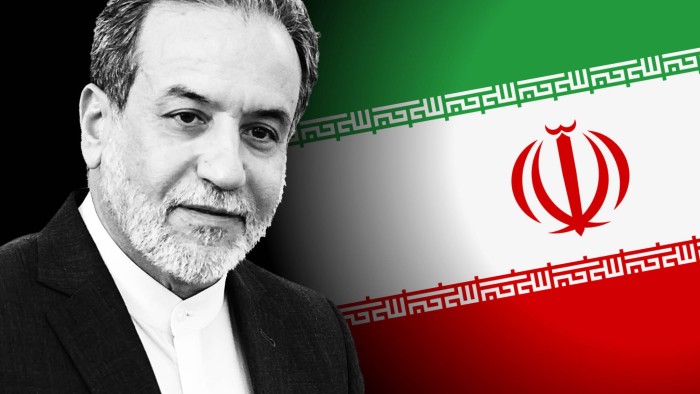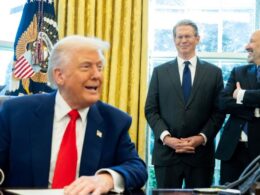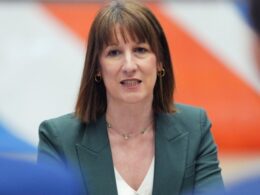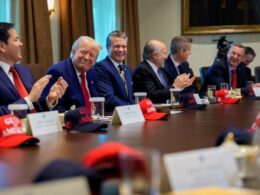Around the time a young real estate lawyer named Steve Witkoff was befriending Donald Trump in 1980s New York, Abbas Araghchi was serving with the Islamic Revolutionary Guard Corps on the frontline of the brutal Iran-Iraq war.
Now, four decades later, the 62-year-old is Supreme Leader Ayatollah Ali Khamenei’s personal pick to lead Iran in talks with Witkoff, Trump’s envoy, that could determine whether the country strikes a nuclear deal with the US — or descends into military conflict.
The British-educated foreign minister, known for his understated demeanour, helped secure the 2015 nuclear agreement with world powers that Trump abandoned during his first term as US president, an experience that has left the diplomat well placed to try to thrash out a deal.
And crucially, politicians, diplomats and analysts say Araghchi stands out as someone who has managed to stay above Iran’s fierce political infighting and cultivate support across rival factions. Elevated to the job under reformist President Masoud Pezeshkian, he also has roots in conservative circles through his prominent religious family and maintains links with the Revolutionary Guards.
“He is the right person at the right time to play a historic role, and all political factions agree on this,” said Saeed Laylaz, a reformist analyst. “His political, diplomatic and security credentials, coupled with his experience in nuclear talks, have placed him in a unique position.”
Araghchi and Witkoff are set to meet for a fourth round of indirect talks in Oman on Sunday.
Unlike Araghchi, Witkoff had no prior diplomatic experience before Trump appointed him. Yet both enjoy the full confidence of their leaders, raising tentative hopes that a breakthrough might be possible, despite huge distrust and the complexity of reaching a deal acceptable to both sides.
Iranian analysts believe that any prospective deal will hinge in part on the two men’s personal rapport. Araghchi, who is guarded in his public comments, has repeatedly said he feels “cautious optimism”.
The countries, however, appear far apart on crucial issues, and some western and regional diplomats still believe that military conflict is a high possibility.
US officials have given mixed messages over what they expect from Tehran. Witkoff told Breitbart on Friday that the Islamic republic had to dismantle its three main nuclear facilities and warned that if talks do not make progress on Sunday, “then they won’t continue and we’ll have to take a different route”.
“That’s our red line. No enrichment. That means dismantlement,” he said. Secretary of state Marco Rubio, however, has said the US may accept Iran keeping a nuclear programme if it stops enriching domestically and imports fissile material.
This, in turn, is a red line for Iran, which insists the country must be able to continue enriching uranium for civilian purposes. Iran has signalled it is willing to provide guarantees assuring the international community of the programme’s peaceful intent.

Under the 2015 Joint Comprehensive Plan of Action (JCPOA) deal, Iran agreed to strict curbs on nuclear activity but was able to continue enriching a limited amount of uranium up to 3.67 per cent purity. Since the deal collapsed, however, Iran has increased enrichment to up to 60 per cent, close to weapons grade.
Araghchi has also resisted any US attempts to broaden the talks to include its missile capabilities and regional security strategy. “Both sides are determined,” Araghchi said after the end of the third round of talks in Muscat. “But determination alone does not guarantee success.”
Western diplomats in Tehran respect what they say is Araghchi’s tact. He was born in Tehran to a well-known trading family. After fighting in the Iran-Iraq war, he earned a PhD in politics at the University of Kent before entering the foreign service, serving as ambassador to Finland and Japan and becoming deputy foreign minister during the previous nuclear talks.

Crucially, Araghchi did not fall victim to the political infighting that engulfed former president Hassan Rouhani and his foreign minister Mohammad Javad Zarif, architects of the JCPOA who were later sidelined by hardliners over their role in the deal.
“Araghchi avoids contentious politics. That’s a strength in the current climate,” said Rahman Ghahremanpour, a foreign policy expert close to former negotiators. “Even hardliners now feel they have a stake in the talks — unlike before, when they felt excluded and humiliated.”
The reformist president Pezeshkian has kept a low profile, something analysts interpret as a deliberate move to avoid antagonising hardliners and give Araghchi room to liaise with the Revolutionary Guards, Iran’s most powerful military institution with vast political influence, and Khamenei, to whom he has direct access.
Laylaz said that while “the real leadership of the talks rests with Mr Khamenei and the security forces”, the foreign minister is “so well-co-ordinated with them that there are barely any gaps in the process”.
The talks come at a time when Iran is embroiled in its gravest crisis since the 1980s war.
Israel has over the past 18 months launched devastating offensives against Iranian proxy forces such as Hizbollah, while the Islamic republic also lost a key ally with the collapse of the Assad regime in Syria. Tit-for-tat strikes with Israel last year exposed vulnerabilities in Iran’s military infrastructure, with Israel claiming to have hit a component of Iran’s nuclear programme.
New US sanctions imposed under Trump, part of his “maximum pressure” campaign, have added to the economic vulnerability.
To ease Iran’s isolation and build up support for a nuclear agreement, Araghchi has travelled widely in recent weeks, briefing allies such as Russia and China as well as regional powers like Saudi Arabia, which opposed the 2015 accord but now backs a diplomatic solution.
Yet Araghchi knows that, without results, his political capital at home may not last for ever.
“He is acutely aware of what befell the architects of the JCPOA — and knows it could happen to him,” said Ghahremanpour. “That’s why he avoids exaggerated optimism. He always stresses he is ‘cautiously optimistic’ — just in case the talks fail.”
Source link










